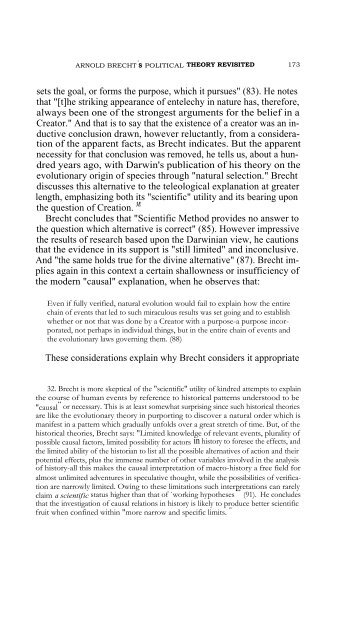ARNOLD BRECHT'S POLITICAL THEORY REVISITED Political ...
ARNOLD BRECHT'S POLITICAL THEORY REVISITED Political ...
ARNOLD BRECHT'S POLITICAL THEORY REVISITED Political ...
You also want an ePaper? Increase the reach of your titles
YUMPU automatically turns print PDFs into web optimized ePapers that Google loves.
<strong>ARNOLD</strong> BRECHT ' S <strong>POLITICAL</strong> <strong>THEORY</strong> <strong>REVISITED</strong> 173<br />
sets the goal, or forms the purpose, which it pursues" (83). He notes<br />
that "[t]he striking appearance of entelechy in nature has, therefore,<br />
always been one of the strongest arguments for the belief in a<br />
Creator." And that is to say that the existence of a creator was an inductive<br />
conclusion drawn, however reluctantly, from a consideration<br />
of the apparent facts, as Brecht indicates. But the apparent<br />
necessity for that conclusion was removed, he tells us, about a hundred<br />
years ago, with Darwin's publication of his theory on the<br />
evolutionary origin of species through "natural selection." Brecht<br />
discusses this alternative to the teleological explanation at greater<br />
length, emphasizing both its "scientific" utility and its bearing upon<br />
the question of Creation. 3E<br />
Brecht concludes that "Scientific Method provides no answer to<br />
the question which alternative is correct" (85). However impressive<br />
the results of research based upon the Darwinian view, he cautions<br />
that the evidence in its support is "still limited" and inconclusive.<br />
And "the same holds true for the divine alternative" (87). Brecht implies<br />
again in this context a certain shallowness or insufficiency of<br />
the modern "causal" explanation, when he observes that:<br />
Even if fully verified, natural evolution would fail to explain how the entire<br />
chain of events that led to such miraculous results was set going and to establish<br />
whether or not that was done by a Creator with a purpose-a purpose incorporated,<br />
not perhaps in individual things, but in the entire chain of events and<br />
the evolutionary laws governing them. (88)<br />
These considerations explain why Brecht considers it appropriate<br />
32. Brecht is more skeptical of the "scientific" utility of kindred attempts to explain<br />
the course of human events by reference to historical patterns understood to be<br />
"causal " or necessary. This is at least somewhat surprising since such historical theories<br />
are like the evolutionary theory in purporting to discover a natural order which is<br />
manifest in a pattern which gradually unfolds over a great stretch of time. But, of the<br />
historical theories, Brecht says: "Limited knowledge of relevant events, plurality of<br />
possible causal factors, limited possibility for actors in history to foresee the effects, and<br />
the limited ability of the historian to list all the possible alternatives of action and their<br />
potential effects, plus the immense number of other variables involved in the analysis<br />
of history-all this makes the causal interpretation of macro-history a free field for<br />
almost unlimited adventures in speculative thought, while the possibilities of verification<br />
are narrowly limited. Owing to these limitations such interpretations can rarely<br />
claim a scientific status higher than that of `working hypotheses "' (91). He concludes<br />
that the investigation of causal relations in history is likely to produce better scientific<br />
fruit when confined within "more narrow and specific limits. "
















